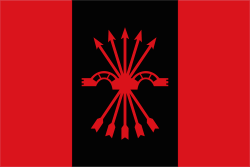Movimiento Nacional


The Movimiento Nacional (National Movement) was the name given to the nationalist inspired mechanism during Francoist rule in Spain, which purported to be the only channel of participation to Spanish public life. It responded to a doctrine of corporatism in which only so-called "natural entities" could express themselves: families, municipalities and unions.
Composition
The Movimiento Nacional was primarily composed of:
- the one-party state, named Falange Española Tradicionalista y de las Juntas de Ofensiva Nacional Sindicalista (known as Falange Española, acronym: FET y de las JONS) which had been created at the beginning of the Spanish Civil War. Other parties were prohibited (the sole name of "party" was prohibited to design any type of organization).
- the trade union organization, called Sindicato Vertical, composed of corporativist organizations which gathered employers and workers, in opposition to Marxism's class warfare.
- All civil servants and any holder of some sort of public office was requested to swear an oath to the Principios del Movimiento Nacional (Principles of the National Movement)
Leadership
The National Movement was led by the caudillo Francisco Franco, titled "Jefe del Movimiento (Chief of the Movement), assisted by a "Minister Secretary General of the Movement". The hierarchy extended itself to all of the country, with a "local chief of the movement" named in each village.
Ideology
| Part of a series on |
| Falangism |
|---|
 |
|
Literature
|
|
Related topics |
| Politics portal |
People who strongly identified with the Movimiento Nacional were colloquially known as Falangistas or Azules (Blue), from the colour of the shirts worn by José Primo de Rivera's fascist organization created during the Second Republic. Camisas viejas (Old shirts) enjoyed the honour of being historical members of the Falange, compared to Camisas nuevas (New shirts), who could be accused of opportunism.
The ideology of the Movimiento Nacional was resumed by the slogan ¡Una, Grande y Libre!, which stood for the indivisibility of the Spanish state and the refusal of any regionalism or decentralization, its imperial character, both past (the defunct Spanish Empire in the Americas, and foreseen in Africa), and its independence towards the purported "Judeo-masonic-Marxist international conspiracy" (a personal obsession of Franco), materialized by the Soviet Union, the European democracies, the United States (until the Pact of Madrid of 1953) or the "exterior enemy" which could threatened the nation at any time, as well as towards the long list of "internal enemies", like "anti-Spanish", "reds", "separatist", "liberals", "Jews" and "Freemasons", among others, coining expressions like "judeomarxistas".
Francoist "families"
Since one-party rule was enforced in Francoist Spain, the only way of pluralism consisted in internal "families" (Familias del Regimen, i.e., different groups of pressure) competing together inside the National Movement. These included the Catholic "family" (which brought the Roman Catholic Church's support and the national Catholicism ideology), the monarchist "family" (or conservative right, composed of many former members of the Spanish Confederation of the Autonomous Right), the traditionalist "family" (issued from Carlism), the military tendency (figures close to Franco himself, including the so-called africanistas) and the Azules themselves or national syndicalists, who controlled the bureaucracy of the so-called Movement: Falange, Sindicato and many others organizations, such as the veterans' national grouping (Agrupación Nacional de Excombatientes), the women's section (Sección Femenina), etc.
Franco held his power by balancing these internal rivalries, cautious not to show any favoritism to any of them nor compromise himself too much to anyone. Thus, all were united by a common interest, the continuation of Franco's defense of traditional Spanish society. The relative plurality of Francoism, inside the official frame of the Movimiento Nacional, has compelled historians such as Juan Linz to classify Francoism as an authoritarian, rather than totalitarian, political system.
Ministers Secretaries General of the Movement
- Raimundo Fernández-Cuesta y Merelo (January 30, 1938 – August 9, 1939) (1st time)
- Agustín Muñoz Grandes (August 9, 1939 – 1940)
- José Luis Arrese Magra (May 19, 1941 – July 20, 1945) (1st time)
- Raimundo Fernández-Cuesta y Merelo (November 5, 1948 – February 15, 1956) (2nd time)
- José Luis Arrese Magra (February 15, 1956 – February 25, 1957) (2nd time)
- José Solís Ruiz (February 25, 1957 – 1969) (1st time)
- Torcuato Fernández-Miranda (1969 – January 1974)
- José Utrera Molina (January 1974 – March 4, 1975)
- Fernando Herrero Tejedor (March 4, 1975 – June 12, 1975)
- José Solís Ruiz (June 1975 – December 12, 1975) (2nd time)
- Adolfo Suárez González (December 12, 1975 – July 6, 1976)
- Ignacio García López (July 7, 1976 – April 13, 1977)